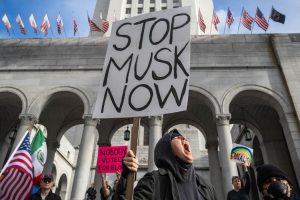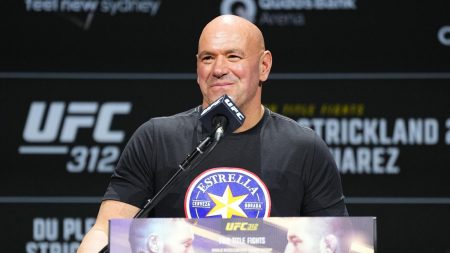Trump voters loved the idea of Elon Musk taking a meat cleaver to the federal government. But now that the Tesla CEO is rampaging through the halls of DC swinging a chainsaw, public sentiment is shifting. And it’s starting to ding the Tesla brand.
The company’s Loveland, Colorado, store was vandalized on Feb. 7, the third time in a month, with “offensive and hateful” graffiti, while about 50 people gathered in San Luis Obispo, California, outside a Tesla shop last week to protest federal budget cuts by Musk’s Department of Governmental Efficiency, or DOGE. A similar protest also occurred in San Diego over the weekend. The billionaire CEO’s bizarre, Nazi-style salute at a Trump victory celebration last month spurred protestors in the Netherlands to paint swastikas and anti-Musk sentiments on a company store in The Hague. Musk derided comparisons to the Sieg Heil salute as “dirty tricks,” saying “the ‘everyone is Hitler’ attack is sooo tired.”
In Germany, police are looking into whether groups that projected an image of Musk giving the straight-armed gesture onto the side of Tesla’s Berlin Gigafactory, along with the phrase “Heil Tesla,” broke laws against displaying Nazi symbols. There’s also been a call for a Tesla boycott in Poland. Trump’s tariff threats on Canada have also led to calls for boycotts of its electric vehicles, as well as Musk’s X social media platform and Starlink, in that country.
Investors are spooked too. Since Tesla stock peaked at an all-time high of $479.86 on Dec. 17, the stock has plummeted 27%, closing at $350.73 on Monday.
Even the Musk superfan equity analysts who cover Tesla are starting to change their tune. Despite Musk’s increasingly polarizing political comments over the past year, many tended to downplay any potential blowback for the brand, typically celebrating Musk’s ambitious plans for robotaxis, robots and AI. But his behavior — and public sentiment turning against him — is getting tougher to ignore.
“Opinions on Elon Musk have taken a turn for the worse along political affiliations. Democrats are clearly being skeptical of `handing over government data to a nonelected billionaire’ while many Republicans seem to be supporting DOGE, or at least are happy with Musk’s support of Trump,” Stephen Gengaro, an analyst with Stifel, said in a research note. Unfortunately for Tesla, most future EV owners are Democrats, he said.
Tesla trades at a higher price and with a higher PE ratio than any other automaker in large part because of its association with Musk. Many investors share an unshakeable belief that the company will remain the industry’s EV leader as it expands into new businesses, especially by launching a long-promised robotaxi service. But the timing and viability of the latter goal is highly questionable and Tesla’s slumping sales don’t look good for the business that generates most of its revenue.
Tesla posted its first annual sales drop last year since its 2010 IPO, and the first month of 2025 showed no change in that trend. A raft of reports that came out last week showed Tesla sales dropping in China, its biggest and most profitable market, by 11.5%, in addition to huge drops in France, Germany, Norway and the U.K. of 63%, 59%, 38% and 12%, respectively. U.S. sales results won’t be available until the end of the first quarter, though Tesla fell 5.6% in the U.S. last year, led by a 12% drop in California, the nation’s top EV market.
Publicly, there’s been no indication that Tesla’s board of directors is making any effort to restrain Musk or modify his comments on social media. Company chair Robyn Denholm, who last week sold 112,390 Tesla shares worth about $43 million, didn’t respond to a request for comment.
Tesla’s popularity with U.S. carbuyers is also sagging. Strategic Vision, a San Diego-based research firm that surveys tens of thousands of consumers weekly, said last month that nearly two-thirds of potential new carbuyers say they definitely would not consider a Tesla as their next vehicle, up from 48% in 2023.
It’s an especially tricky time for public sentiment to turn against Musk and Tesla as the Austin-based company doesn’t have any major new products ready to hit the market, though it’s promised to add lower-priced models later in the coming months. Its most recent addition, the bulky $100,000 Cybertruck, is selling at less than a quarter of the annual volume Musk predicted a year ago.
Trump has also moved to end a $7,500 federal tax credit for new EV purchases, an incentive for which Tesla buyers were the top beneficiaries. The new administration also cut off federal support to build public EV chargers and programs that were sending millions of dollars to Tesla for opening its existing Supercharger network to competing auto brands.
Tesla’s problems are a big deal for Musk, not simply because he’s the CEO and in that role should do everything possible to avoid harming the company. It’s also the top source of his phenomenal wealth, valued by Forbes at $391 billion as of Feb. 10.
Read the full article here









